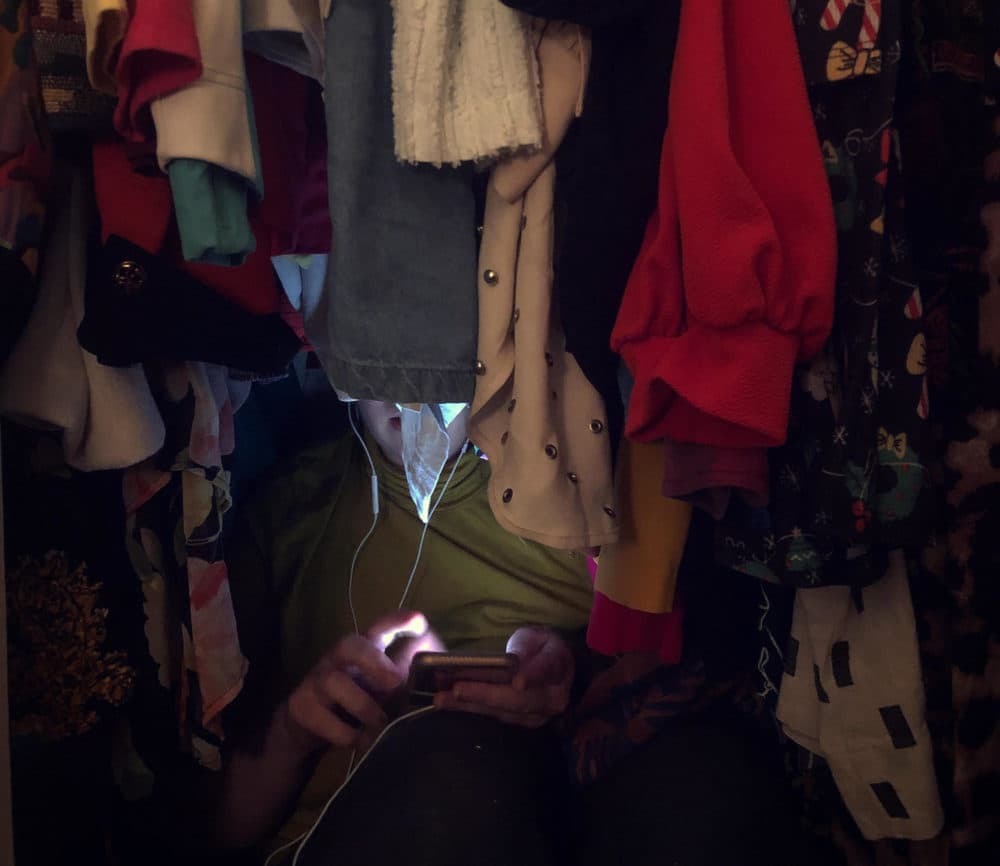Advertisement
Review
Get Under The Covers Or Crawl Into The Closet — It's All Part Of A Gripping 'Baby Jessica' Play

Curled beneath my dining room table in the dark, I listen to a montage of news stories. The news — and accompanying music — centers on 18-month-old Jessica McClure who fell into a well in Midland, Texas. More than 30 years ago, the toddler, dubbed “Baby Jessica,” became trapped 22 feet below the surface. The nation prayed for Jessica, donated money to her family and watched hourly updates about her harrowing encounter. Jessica’s fall and 58-hour rescue is the inspiration behind WalkUpArts’ “Baby Jessica’s Well-Made Play,” an experimental, ambitious show that packs an emotional wallop. Hours after I participated in it, I was still thinking about it.
The interactive play is a five-act conversation about fear, hope, culture, and memory that begins the moment Jessica falls into the well. Due to COVID-19, instead of a stage, costumes, lighting and onlookers, “Baby Jessica’s Well-Made Play,” relies solely on the actor and the audience — an audience of one. The entire show by playwright and WalkUpArts co-founder Philip Santos Schaffer is performed for one person at a time over the phone. Taking place over two nights, the show includes audio, live performances and a mysterious fifth act.

Audience members are encouraged to erect their own mini-theaters that best mimic the well. You could close yourself up in a closet or toss a mountain of coats on the bed and dive in. To get ready for the three-hour play on the first night, I put a thick comforter over my dining room table to make a fort of sorts. I leave most of the chairs in place, turn off the lights and crawl in. It’s tiny, and I can’t sit up.
While listening to the audio, with sound and music by Jorge Olivo and dramaturgy by Anna Woodruff, I learn more about Jessica’s ordeal — the eight-inch hole she fell through, the challenges her rescue posed and the injuries she suffered — and converse with performer Mary Round. Round addresses me as though I’m Jessica during the play and acts as a comforter and storyteller. Between bits about Jessica and moments of intentional silence, Round shares more about her life. She talks about fear, the power of miracles and feeling lost. She tells me about finding peace in the darkest place she’s ever been and shares how her father once encouraged her to save herself when she climbed too far up a tree and didn’t think she could get down when she was young.

What’s most unique about our conversation, or this play — with direction from Isabel Quinzaños Alonso, who works in The Public Theater's development department — is that the audience member doesn’t just listen to performers talk on a panel after a show is over as with most in-person theater performances. In “Baby Jessica’s Well-Made Play” you become part of the show. Round’s questions and advice force me to consider more than just Jessica’s incident. It feels like the well becomes a metaphor for the darkness and uncertainty of life. Relying on Round’s company in the night, I think of our interconnectedness and sometimes, our reliance on the kindness of strangers for rescue. I share things with her that I didn’t expect to. I tell her about my friend who died while she was pregnant and about a time in my life where I felt so stuck and lost that I left everything behind. I am forced to think about how I feel about myself; the unfortunate incidents life has thrust upon me at times, and the light that exists at the end of turmoil.
This isn’t the first time Santos Schaffer created a play that prompts interaction and introspection. His “The End of the World Bar and Bathtub” focuses on conviction and choice. For that narrative, the play tours to ticketholders’ bathrooms for a conversation about the end of the world. The script for that show, Santos Schaffer writes on his website, is 19 pages long and he performs anywhere from half to all of it depending on how it goes. The length of the play depends on the audience. The shortest play performed was 45 minutes, the longest so far, over three hours.

Interaction anchors Santos Schaffer’s work. He believes that we’re all extremely lonely and his pieces work to connect us. The multi-disciplinary artist studied directing at Hofstra and later dramaturgy at Columbia University. He develops plays in which “actors and audience members are asked to share aspects of themselves in ways that may be unfamiliar.” His work aspires to give people space to “consider themselves from a new perspective and share what they discover.” He told the New Yorker that “All of the plays are built around pushing audiences to experience empathy in a new way.”
And that rings true.
As the last glimmer of light disappears from the sky and the dining room becomes pitch black, I think more about how this baby must have felt as the news of the event continues to unfold in my ears. In this warm, but unfamiliar cocoon I’ve created, Round’s soothing voice is my only interaction. Later, I kick over a nearby glass of water that seeps into my jeans. The spill further pulls me into the dank space baby Jessica occupied. Was she wet and cold? What were the stories or words of encouragement shared with her while she waited in the dark to be saved?
Before my time with Round ends, I’m urged to figure out what I want to leave behind in this well. I know the answer right away and pledge to leave the fear of not being enough and the pain from personal losses behind. Later, for Acts 3 and 4, I hear from former audience members over the phone and compare notes in a way. One wants to know what I believe she can do daily to change the world just a little. The other tells me her ideas on how I can make an impact. I write it down and vow to try. And just like that, with a few conversations between strangers under the belt, I crawl from beneath that table feeling a little less lonely and more connected.
“Baby Jessica’s Well-Made Play” runs now through Nov. 22.

